Is your fridge full of spoiling food? Storage tips to avoid wastage and to save money
Advertisement
Wellness
Is your fridge full of spoiling food? Storage tips to avert wastage and to save money
Exercise you end upward with a lot of dairy items, fruits and vegetables you tin't use? Experts tell you how best to shop these in the fridge.
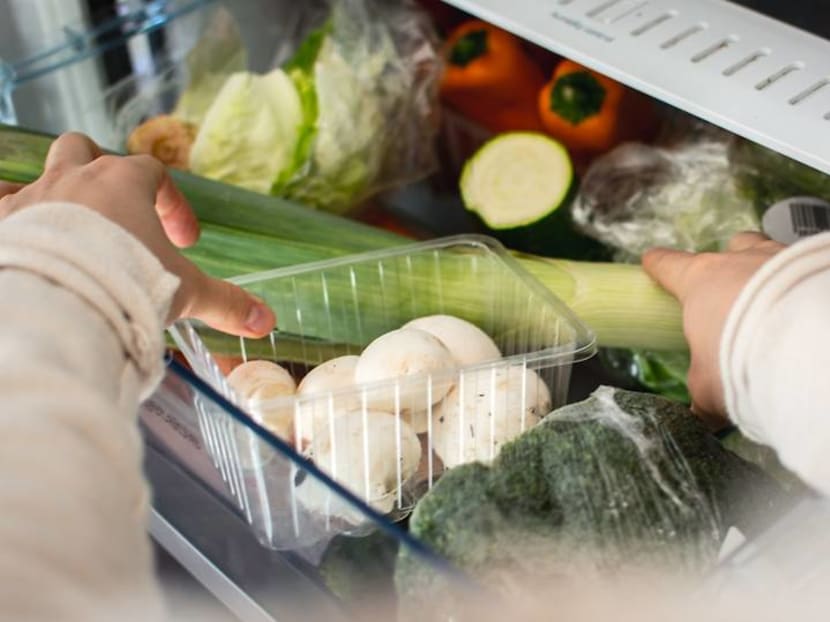
(Photograph: Freepik/foodiesfeed)
28 Oct 2022 06:30AM (Updated: 08 Aug 2022 12:04AM)
When was the last time you checked the contents of your refrigerator? And nosotros don't mean rummaging through the freezer for that last potong ice foam.
If y'all haven't been scrutinising the crisper compartment – specially if you lot've been stocking up on fresh herbs and vegetables for a flake of home cooking – you might have a funky surprise lurking in there.
That unsavoury discovery in your refrigerator isn't unique to y'all. In a 2022 report commissioned by the National Environs Agency (NEA), 24 per cent of the 443 households surveyed said that they often threw away spoiled nutrient, and the summit two reasons for doing then were a result of buying besides much, and having nutrient items hidden at the back of the fridge.
READ: Cooking tips: How to make canned food and instant noodles more than nutritious
Furthermore, the amount of avoidable nutrient waste is equivalent to each household throwing abroad a two.5kg bag of rice every week, co-ordinate to the study.
Food wastage isn't a recent development either. The NEA noted that the amount of nutrient waste matter generated in Singapore has increased by virtually forty per cent over the last ten years. In 2016, the amount of nutrient waste generated was equivalent to the weight of over 3,500 MRT trains.
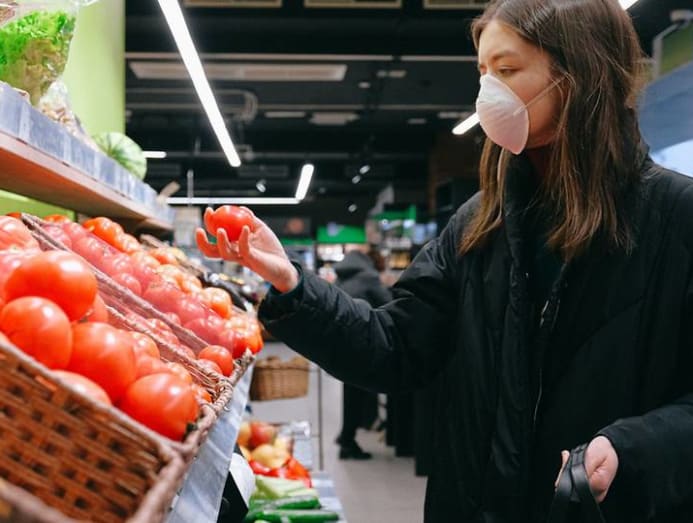
When information technology comes to perishable food, don't buy in bulk. It may seem like you're saving money when yous purchase more only if yous have to throw out the limp bok choy, yellowed broccoli, mushy tomatoes and disgustingly clammy mushrooms because you tin't utilise them, y'all end up wasting money instead.
A adept idea is to program for the meals you lot're cooking and buy just enough.
Some online recipes even have ingredient calculators and so you lot can adjust the ingredient quantities to suit your family'due south needs. And you wouldn't have to feel bad virtually throwing away nutrient.
MAKE SURE YOUR Refrigerator IS COLD ENOUGH
Do yous know what your refrigerator's temperature should be? Betwixt zero and 4 degrees Celsius for the fridge, and -12 degrees Celsius and beneath for the freezer compartment, according to NEA.
"Temperatures of v degrees Celsius or college increase enzymatic activity and respiration, and reduce shelf life," said Dr Antara Chakraborty, a lecturer with Democracy Polytechnic's School of Technology.
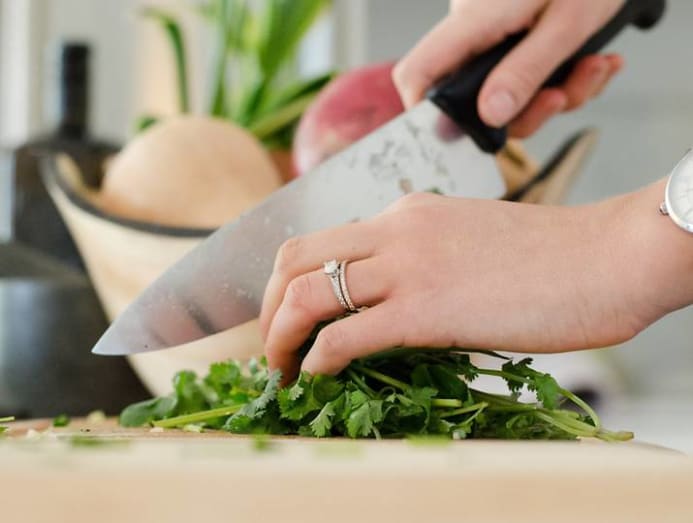
If you're extra cautious, reject the temperature of your refrigerator even lower, advised Catherine Seah, a lecturer from Nanyang Polytechnic's School of Chemical & Life Sciences.
Clostridium botulinum may exist able to grow and produce harmful toxins if the temperature of the fridge is non consistently maintained below 3 degrees Celsius, she said.
A simple way to check your fridge'due south temperature without fancy equipment is to identify a regular thermometer in a cup of water and put information technology in the fridge compartment.
For freezer temperatures, do the same with the thermometer within alcohol or cooking oil because water would freeze.
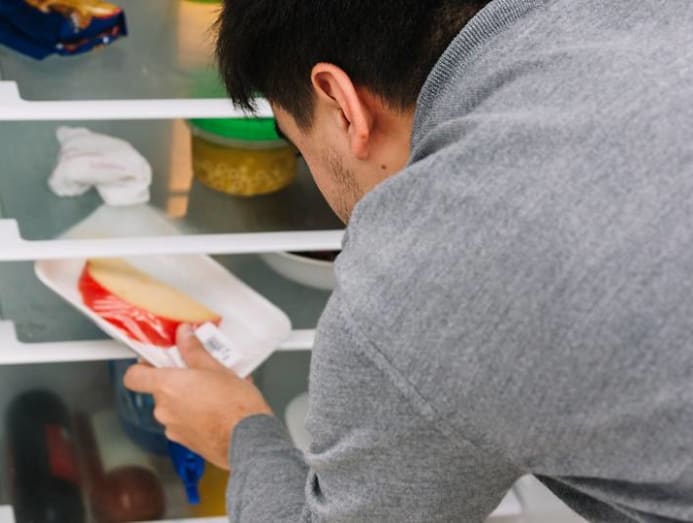
VACUUM-SEAL FOR fifty PER CENT LONGER FRESHNESS
Vacuum-sealing tin can stretch the shelf life of fruits and vegetables by up to 50 per cent; for fish, information technology can exist extended by half dozen to 18 days, said Dr Chakraborty.
"Vacuum-sealing removes oxygen, and so the oxidative reaction in the food during storage is reduced."
A vacuum environment too prevents the growth of aerobic microorganisms, such as sure bacteria and fungi, which require oxygen to grow, she said.
The amount of avoidable food waste product is equivalent to each household throwing abroad a 2.5kg bag of rice every week.
Consider the other benefits, too.
"The food items are protected from dehydration and freezer burn down every bit moisture cannot evaporate, and water ice crystals cannot class when sealed off from oxygen," said Alexandra Jakobs, a product manager with Bosch'due south product division consumer products.
VACUUM-SEALING PRECAUTIONS
Before you ability up your sealer, it is important to ensure you observe food hygiene practices, said Seah.
This is because anaerobic microorganisms such as Listeria monocytogenes, which do not need oxygen to grow, can still multiply if they go into the vacuum-sealed bags despite existence at a refrigerated temperature, she cautioned.
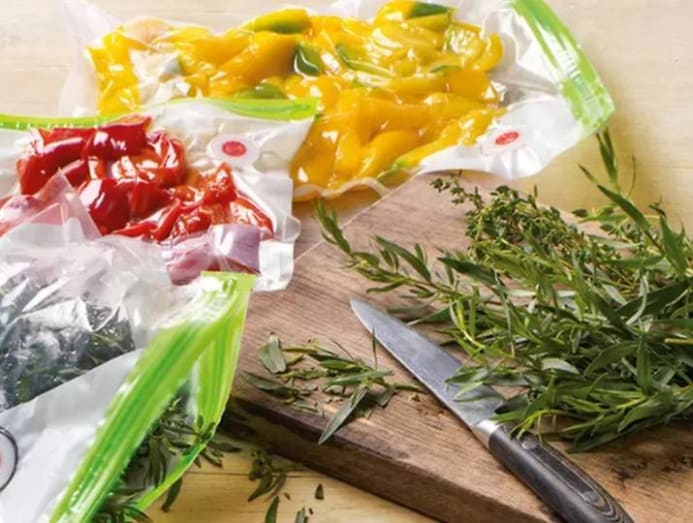
And so, there are some foods that can't be vacuum-sealed, said Seah. These include fresh mushrooms, onion, garlic and soft cheeses as they may contain anaerobic bacteria.
Sealing such microorganisms in with food may lead to bacterial growth that can cause botulism, a potentially fatal illness caused by the bacterium Clostridium botulinum, she cautioned.
When it comes to produce that bruise hands such as strawberries, freezing before vacuum-sealing may work ameliorate.
"It may protect the texture and integrity of the produce," said Seah, explaining that when air is pulled out of the bag, unfrozen berries will compress and the juice will be squeezed out.
READ: Exercise you microwave food in plastic containers? Exist conscientious of leaching chemicals
Jakobs recommended some prep work before sealing your fresh food. "Always rinse and/or skin fruits and vegetables thoroughly."
When sealing juicy, moist or marinated nutrient, hang the bag up instead of placing information technology flat on the counter. This way, the liquid in the bag would not become under the vacuum seal and mess up your equipment.
Alternatively, use containers that are suitable for vacuum-sealing to forestall a mess when sealing nutrient with liquid.
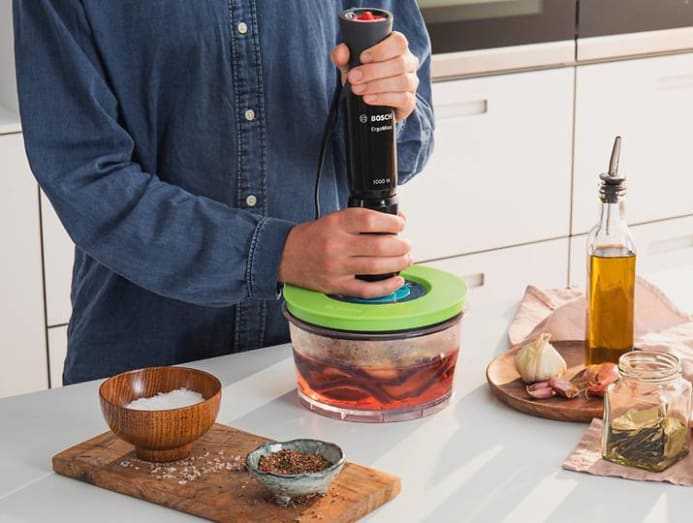
Vanquish ETHYLENE GAS BEFORE SEALING
Sometimes, you can't terminate ethylene-producing fruits and vegetables from continuing to gas out in their vacuum-sealed pouches.
There are a few ways to get around it. Jakobs, for instance, suggested blanching vegetables such as asparagus, green beans, cauliflower and cabbage before sealing them.
For produce that tin can't be blanched such as fruits, Dr Chakraborty recommended dropping some ethylene absorbents into the bag before vacuum-sealing them.
KEEP DAIRY ITEMS IN THE CENTRE OF THE Fridge
Most people keep their cartons of milk on the fridge door as it's convenient to have them out.
Just that location might make information technology spoil faster because information technology's not every bit cold as the heart of the refrigerator – in fact, about four.5 degrees Celsius warmer than the fridge'south center portion, according to a 2022 study by Cardiff Metropolitan Academy.
Even ameliorate, tuck the milk carton right at the dorsum of the fridge where it's the coldest. Information technology's likewise a good spot for your cheese, provided information technology'south below 4 degrees Celsius.
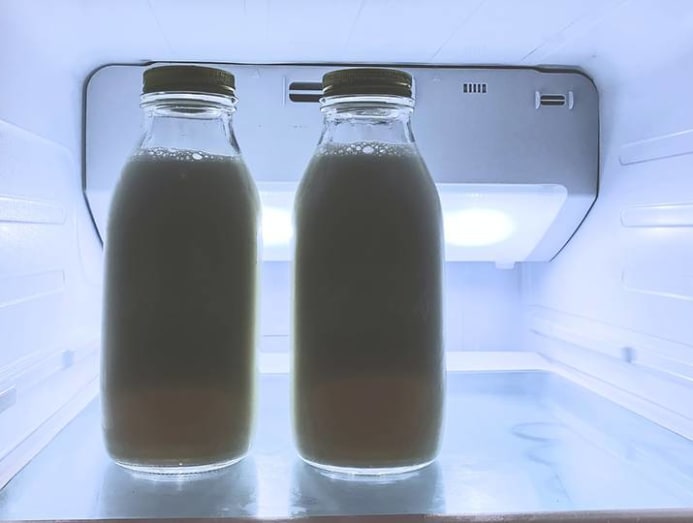
Simply earlier you leave your cheese there, take it out of its plastic packaging and wrap it in wax or parchment paper first, advised the American Cheese Lodge.
Soft cheeses such as brie and cottage cheese would last a week, while hard ones, including cheddar, are expert for iii to four weeks.
ADD OIL TO LEFTOVER Tomato PASTE
Whether you lot're cooking a paella or stew, or making pizza or pasta, you're bound to have some leftover tomato paste in the can.
To foreclose the typical black band from forming effectually the inside of the tin when left in the fridge, pour a thick layer of oil to cease the edges of the paste from drying and oxidising.
Anaerobic microorganisms such every bit Listeria monocytogenes, which practice not demand oxygen to grow, tin can all the same multiply if they go into the vacuum-sealed bags despite beingness at a refrigerated temperature.
When it'due south time to use, spoon off the oil, take the amount of paste you need, and cascade the oil dorsum. If a ring has already formed, employ a newspaper towel to scrape it off before scooping out the paste.
DON'T PUT APPLES AND BANANAS TOGETHER
Some fruits and vegetables release a ripening gas known as ethylene; meanwhile, certain produce are more sensitive to ethylene than others.
For instance, apples are known to be ethylene producers, while bananas are sensitive to the gas. Put them together – fifty-fifty exterior the refrigerator – and yous'll see that the banana turns brown and mushy quicker.
READ: Does cooking with an air fryer actually mean eating salubrious? It depends on you
Packing ethylene-producing fruits and vegetables such every bit avocados, kiwis, tomatoes and peppers in a bag before putting them in the refrigerator has the same quick-ripening result (unless that's your intention), so be sure to store them apart.
Hither are more than examples to keep separately:
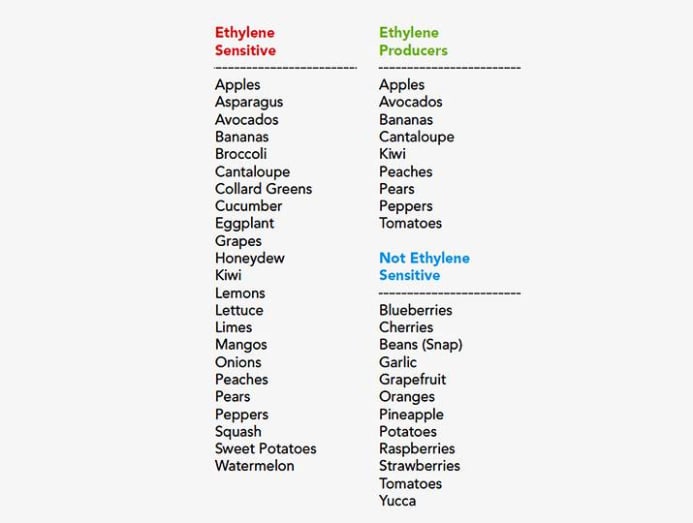
USE PAPER TOWELS TO STORE SALAD LEAVES
Lettuce, arugula, kale and other salad leaves tin wilt and plough slimy if stored in their original plastic packaging.
To absorb the excess moisture the leaves produce during refrigeration, transfer the leaves to a storage container, along with a few sheets of paper towel at the top and lesser, earlier closing the lid.
PLACE MUSHROOMS IN PAPER BAGS
Fresh mushrooms such as brownish, button or portobello mushrooms are best kept subsequently removing them from the cling film and plastic carton they come in.
Instead, put them in a paper bag before leaving them in the fridge for optimal freshness.
Temperatures of v degrees Celsius or higher increment enzymatic activity and respiration, and reduce shelf life.
Care for FRESH HERBS LIKE BOUQUETS
Unless you have Thai basil, parsley or mint growing in your balcony, chances are, you're going to take to purchase fresh herbs from fourth dimension to time.
And chances are, you'll have a big agglomeration of unused herbaceous foliage only rotting abroad in your fridge.
To brand them terminal for up to ii weeks, stick them in a glass of h2o like you would flowers and place a plastic bag over the top.
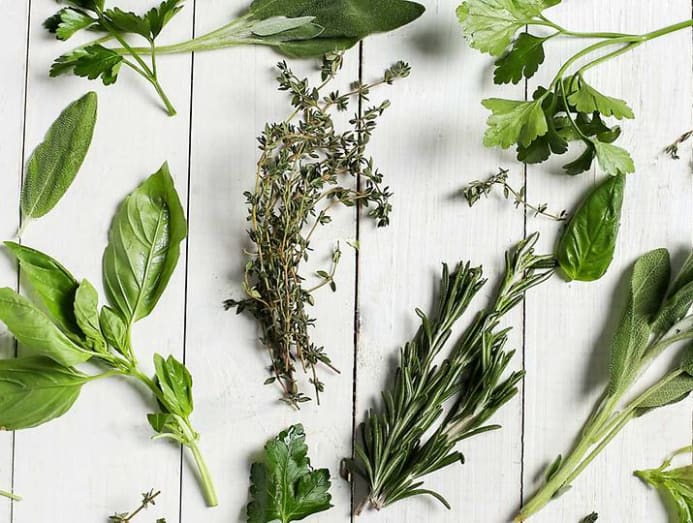
For herbs with hardier stems such as thyme, rosemary and sage, scroll them loosely in a damp paper towel and place them in a resealable plastic bag. They should last ii to fifty-fifty 3 weeks in the fridge.
SOAK BERRIES IN VINEGAR SOLUTION
Strawberries, cherries and blueberries tend to go mouldy in the refrigerator.
To prevent that, soak them in a i-office-vinegar, three-part-water solution once you get dorsum from the supermarket.
Rinse thoroughly, pat dry and they're ready for the fridge.
Source: https://cnalifestyle.channelnewsasia.com/wellness/food-storage-tips-to-minimise-wastage-and-save-money-236256
0 Response to "Is your fridge full of spoiling food? Storage tips to avoid wastage and to save money"
Post a Comment